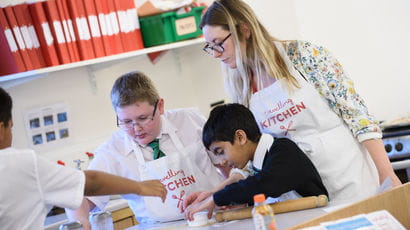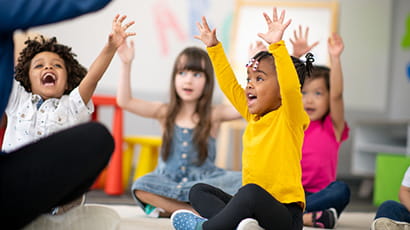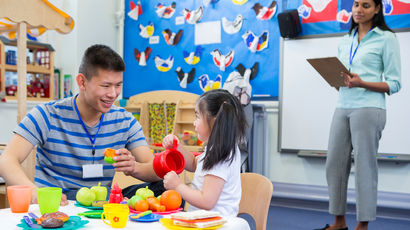Research theme and strands within the Education and Childhood Research Group (ECRG)
Overview
Research within the School of Education and Childhood at UWE Bristol operates within its four inter-connected strands of:
Watch the short video below about the ECRG Showcase and Social event which spotlighted the ECRG strands of research. The event brought together UWE Bristol-based researchers and potential external partners to discuss collaborative research and scholarly possibilities.
ECRG Showcase and Social event, 19 May 2023
Equity in education strand
Co-leads: Professor Richard Waller and Malcolm Richards
Equity in Education (EiE) brings together a community of practice undertaking and engaging with research on critical issues of equity, diversity, and social justice across and within a range of educational contexts and settings. Social justice is central organising principle for the research within the EiE strand, which investigates:
How can education research contribute to the production of a more inclusive, diverse, equitable and just communities and society?
- Sociology of education
- Education politics, policy and ideology
- Widening participation
- Education, social mobility and/or the reproduction of social inequalities
- Decolonisation
- Critical and anti-racist pedagogies
- Social class
- Race, identities, and cultures in education
- Genders and sexualities
- Special Educational Needs and Disabilities
- Student voices, experiences, and decision-making
- Community education, teaching, enquiry and learning
- Global citizenship and knowledge creation
Members of this inter-disciplinary community share a common interest in researching the inequities that persist in societies through critical enquiry. We engage with our local-global students, teachers, and community, to collaborate on exciting research, knowledge co-production, and impactful outcomes.
Our staff have experience in supervising and examining research students in a wide range of themes centring on principles of equity and social justice. We welcome new postgraduate students to conduct research with us, and continue to be open to teacher, school, college and community-led research partnerships.
Current research projects
Anti-racism knowledge exchange partnership between universities in Sweden (Malmo and Lund) and England (UWE Bristol)
Dr Jane Carter, Dr Karan Vickers-Hulse and Dr Sarah Whitehouse are working with Lund University and Malmo University in Sweden to explore how tolerance and anti-racism is taught in teacher education in England and Sweden. Results of discussions with teacher educators and observations and discussions with teacher education students will inform a bid proposal for further research.
Collaborative Online International Learning: International mobility opportunities for student teachers in Botswana, Canada, and the United Kingdom
Malcolm Richards, alongside Obianuju Juliet Bushi (University of Windsor, Canada) and Dr Ishmael Magare (Botswana Open University, Botswana), are exploring understanding of access and availability to international mobility opportunities for Black student-/teachers enrolled in teacher-training programmes in universities in Canada, the United Kingdom and Botswana.
Network for Black Studies in Education: Towards a Centre for Black Studies in Education research at UWE Bristol
Malcolm Richards, Amy Saleh alongside Dr Camille London-Miyo (Stephen Lawrence Research Centre, De Montfort University: UK) have co-developed a network of academics, students, teachers and community educators whose scholarship intersects with deepening understanding of educational experiences of Black peoples of African descent and/or the African diaspora across the the United Kingdom and beyond. The project received funding from the UWE Bristol Arts and Humanities Research Council Impact Acceleration Rapid Response Grant in 2023/24.
Neurodivergent trainee teachers: Understanding experiences to Inform inclusive practice
Jamie Whelan and Kalpa Ghelani explore how UWE Bristol trainee teachers who identify as neurodivergent experience professional teaching practice. It includes participants with formal diagnoses (e.g. ADHD, dyslexia) as well as those who self-identify based on their experiences in placement. The study aims to inform the development of CPD for school staff, mentors, and university tutors to better support neurodivergent trainees through inclusive and reasonable adjustments. Findings will be shared with university and school colleagues to inform practice and may also contribute to future research.
Raise the Bar Conference: Guiding aspiring Global Majority students towards higher education
Kane Allen is organising the Raise the Bar Conference with university, school, and colleague partners, to continue to support Black and minoritised students towards higher education and future career paths. An annual one-day event running since 2022/23, Raise the Bar has successfully hosted hundreds of local students from schools, six form centres, and colleges. Central to its success has been bespoke workshops which highlight creativity and collaboration, where students are able to reflect on the barriers they have faced on their journey to educational success.
The impact of the Raise the Bar Conference extends beyond the event itself, fostering mentorship programs and helping students secure places at UWE Bristol, playing a crucial in promoting empowerment, addressing educational barriers, and strengthening our local education relationships. Read the feedback from a participating school (Fairfield High School, Bristol).
Social and emotional learning: A measure of social-emotional competence amongst pre-service and early career teachers in England
Dr Leila Walker, Dr Karan Vickers-Hulse and Dr Tessa Podpadec are using tools developed by colleagues in Germany and Yale University (USA) to measure the social and emotional competence of pre-service and early career teachers in England. They have the support of doctoral student, Anna Birchfiel, for scoping the current context and are gathering initial data before submitting a funding bid in collaboration with their colleagues in Germany and America.
Youth violence prevention: supporting young people impacted by serious youth violence
Dr Michael Whelan is working with a multi-disciplinary team including Dr Tom Roberts, Dr Jade Levell and Dr Rosie Cornish (University of Bristol), Professor Christine Goodall (University of Glasgow) and Dr Brian McShane (De Montfort University) to undertake an in-depth analysis of a hospital-based serious youth violence prevention model- 'A&E Navigators'. This research is funded by Youth Endowment Fund, and it will help inform violence reduction practice approaches at national, regional and local levels.
Professional/short course: Introduction to Race, Social Justice and Sustainability
This 30-credit module (Level 7) will enable you to develop a critical awareness of processes of race and social justice in education, and how these intersect with education challenges of addressing global environment crisis, and practice into transformations towards sustainable societies. Module lead: Malcolm Richards.
Pedagogy strand
Co-leads: Dr Benjamin Knight and Dr Paul Redford
Pedagogy is a broadly interpreted and broadly applied umbrella concept covering many aspects of education and overlapping with a wide range associated educational and social concepts. In the Education and Childhood Research Group (ECRG), the Pedagogy research strand is more narrowly focussed on classroom teaching and learning,
The strand has two key elements. The first investigates interpretations of what it means to ‘learn’, what learning looks like, contexts in which it occurs and factors which influence it for individuals and groups. The second element investigates teaching and instruction with a view to developing insights about the most useful ways of organising and configuring teaching in the interest of learning. Research within this strand is predicated on the belief that we have much more to learn about learning and teaching, and that novel insights and new theories are there to be uncovered. Seeking effective and innovative approaches to teaching, appropriate for the 21st century, is a central aim of this research strand.
Our staff have experience in examining and supervising research students in the area of research with children and young people. We welcome new postgraduate research students to conduct research with us.
Childhood, children and young people strand
Co-leads: Dr Tim Clark and Professor Jane Andrews
The Childhood, Children and Young People strand focuses on research into children and young people’s experiences, rights, voices, perspectives, and related policy and practice. The strand is underpinned by a construction of children and young people as agentic meaning makers who are experts in their own worlds (Malaguzzi, 1993) and there is a privileging of research with, rather than on this often overlooked group. The strand aims to showcase work in this area and provoke critical discussion about research with children.
The research expertise of the strand encompasses a range of areas, including, but not limited to:
- Sociology of childhood
- Children’s rights
- Ethical and methodological approaches to research with children
- Literacies, languages and identities
- Teaching, early childhood, pedagogy and curriculum
- Policy relating to children, young people and families
- Early education and learning
- Professional development and identity for early childhood practitioners
- Youth and young people
Our staff have experience in examining and supervising research students in the area of research with children and young people. We welcome new postgraduate research students to conduct research with us.
Find out more about a current research project with Dr Sarah Chicken (Principal Investigator), Embedding children's participation rights in pedagogical practice, funded through the ESRC.
Embedding children's participation rights in pedagogical practice
Sustainability in education strand
Co-leads: Dr Verity Jones and Dr Tessa Podpadec
Research on sustainable development creates knowledge and influences practices to shape sustainable futures and work towards greater social and environmental justice.
UWE Bristol recognises the Sustainable Development Goals (SDGs), designed to take action to combat climate change and its impacts, ensure sustainable consumption and production patterns, end poverty and hunger, improve education and health care for all, and end discrimination against women and girls. The core purpose of this research strand is advancing knowledge in economic, social and environmental dimensions to solve sustainability challenges, create opportunities and shape our communities across the region and beyond as set out in the UWE Bristol Strategy 2030.
The strand members’ research incorporates sustainable development questions about diverse local, national and global contexts. For example: how can we educate children about climate change; how can society approach responsible and ethical consumption; why are there inequalities in global education; how can we achieve gender equality and end violence against women and girls?
Podcast
Listen to Dr Verity Jones chat with Dr Kathy Weston in episode 125 of the Dr Kathy Weston's Get a Grip! Parenting Podcast series about sustainable futures and education, and optimal ways to discuss climate change with children and young people.
Cross-strand research
This section showcases ECRG research that crosses all the Strands.
PEAR Study animation
Read the information below to find out more.
Parliamentary Engagement with Academic Research (PEAR) Study
Professor Alpesh Maisuria has been researching the use of academic research by parliament. This study offers original insights into how the academic and parliamentary research communities could be more aligned for mutual advantage. The study collected data from parliamentary researchers about how they engage with academic research to support MPs. It is the first time that this group of people have been studied, and there are significant implications for academics and also Parliament.
- Animation: The above one-minute animation summarises the study about how researchers working in UK Parliament use academic research to support MPs and their staff.
- Report: The report offers findings from the study (PDF) about how researchers working in UK Parliament use academic research to support MPs and their staff.
- Infographic: The PEAR infographic (PDF) presents the findings from the study for academics to make their research more usable to researchers working in UK Parliament.
- Blogs:
- One area that Professor Maisuria worked on was school inspection:
- Research briefing on School inspections in England: Ofsted
- Quick read for the new 2024 Parliament: Ofsted school inspection in England
- Lord Knight - School inspection in England - alternative options for reform, Westminster Education Forum
- Sir Michael Wilshaw - Future for school inspections in England
- Research briefings: Research briefings produced by Professor Maisuria as a Parliamentary Academic Fellow (PAF).
Bristol Smartphone Experience and School Policy Project
This project set out to uncover the lived experiences and beliefs of young people, parents/carers, and school staff, with the aim of creating an evidence-informed foundation for future policy and support. Dr Ben Knight and Dr Paul Redford studied both secondary and primary schools, offering a view of how smartphones shape young lives, from the first conversations about ownership to the realities of daily use.
The study - the most comprehensive of its type – gathered the views of 3,721 secondary school pupils, 1,595 parents and 352 secondary teachers across schools in inner city, suburban and rural settings in and around Bristol.
You may also be interested in

Research in the School of Education and Childhood
There is strength and diversity in the programme of educational research and evaluation at UWE Bristol. A broad range of substantive areas of enquiry is sponsored by a wide range of funding bodies.

Education and Childhood Research Group (ECRG)
Information about the Education and Childhood Research Group (ECRG) based at UWE Bristol.

Postgraduate research in the Education and Childhood Research Group (ECRG)
Postgraduate research activity in the Education and Childhood Research Group (ECRG), UWE Bristol.
